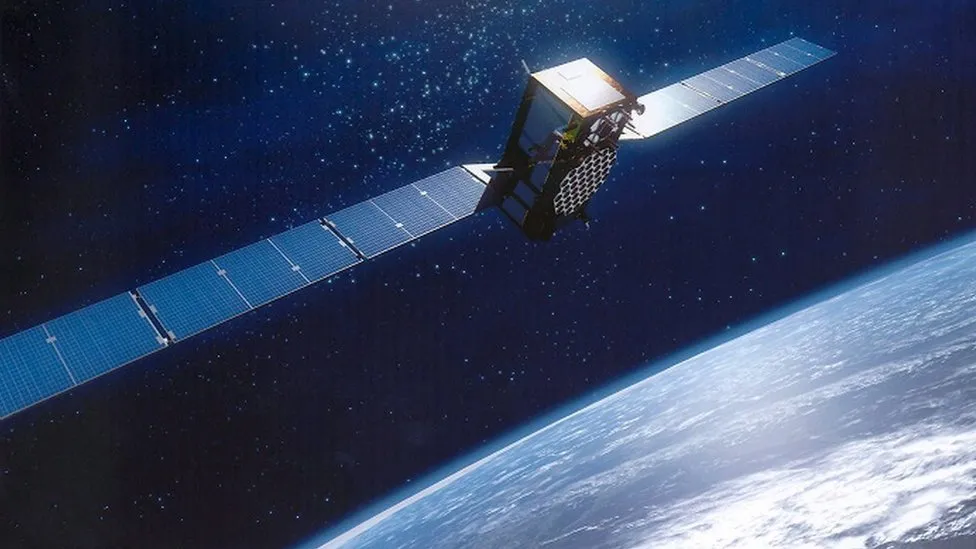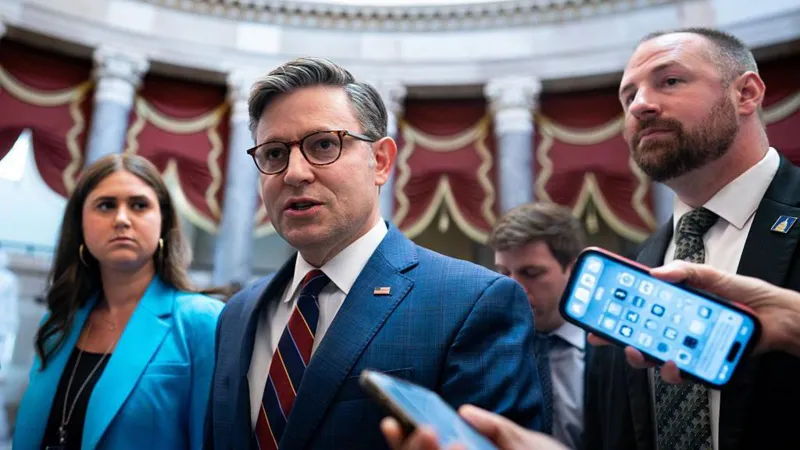Russia developing 'troubling' new anti-satellite weapon, US says
Russia is developing a "troubling" new anti-satellite weapon, the US has said, but it emphasised that Moscow has yet to deploy it.

White House spokesperson John Kirby made the comments a day after a senior House Republican issued vague warnings of a "serious national security threat".
The weapon is space-based and armed with a nuclear weapon to target satellites, the BBC's US partner CBS News reported.
But Mr Kirby did not confirm this and refused to offer precise details on the threat on Thursday.
Moscow accused the US of using claims of new Russian weapons as a ruse to force Congress to pass additional Ukraine aid by "hook or by crook".
Mr Kirby, who was recently made a top aide to President Joe Biden, told reporters that there is no immediate threat to the US public.
"We're not talking about a weapon that can be used to attack human beings. or cause physical destruction, here on Earth," he said.
President Biden was briefed on the intelligence, Mr Kirby said, and that his administration was taking the development of the weapon "very seriously". He added that the president had already ordered "direct diplomatic engagement with Russia" over the threat.
House Intelligence Committee chairman Mike Turner issued a cryptic warning about a serious national security threat on Wednesday, sparking a flurry of rumours around the capital.
On Thursday, Mr Turner and others from the committee met with National Security Advisor Jake Sullivan to discuss the matter further.
"We all came away with a very strong impression that the administration is taking this very seriously and that the administration has a plan in place," Mr Turner said following the meeting. "We look forward to supporting them as they go to implement it."
While space weapons sound ripped from the pages of science fiction novels or films such as Superman II and James Bond's GoldenEye, military experts have long warned that space is likely to be the next frontier of warfare in an increasingly technology-dependent world.
What do we know about the threat?
Other than Mr Kirby's comments, US government officials have yet to publicly reveal any specific details about the threat.
National Security Adviser Jake Sullivan suggested the silence is intentional, telling reporters on Wednesday that the US must prioritise the "sources and methods" its security agencies used to collect intelligence about the threat.
The New York Times, ABC and CBS reported that the threat was related to Russia developing a nuclear-capable weapon that could be used to strike US satellites in space.
Mr Kirby told reporters that there is no evidence that the weapon has been deployed, but emphasised that the US is taking the threat "very seriously".
For years, US officials and aerospace experts have warned that Russia and China have been steadily developing military capabilities in space as they seek to catch up to the US.
A report released by the Washington DC-based Center for Strategic and International Studies last year suggested that Russia is developing a range of anti-satellite (ASAT) weapons, including a missile that was successfully tested against a defunct Soviet-era satellite in November 2021.
One of the report's authors, former top Pentagon intelligence official Kari Bingen, told the BBC that during its war in Ukraine, Russia has already used a variety of other methods - such as cyber attacks and jamming - to hamper satellite communications.
"That is already a part of their warfighting doctrine," she said.
Should the public be worried?
Senior lawmakers - including House Speaker Mike Johnson - have said that there is no need for public alarm.
Mike Turner has also come under some criticism for announcing the threat, with fellow Republican Andy Ogles accusing him of a "reckless disregard" for the "well-being and psyche of the American people".
Experts and former officials, however, have warned that any threat to US satellites could have a far-reaching impact.
More so than any of its potential global adversaries, the US military is heavily dependent on satellite communications for everything from surveillance and missile launch detection to navigation at sea and in the air, GPS-guided bombs and battlefield communications.
"Our military, the way our military fights today and the investment in weapons that we make is all contingent on space capabilities," added Ms Bingen, who was the second-highest ranking intelligence official in the US department of defence. "Without that, we would be in a pretty tough situation. We could not fight the way we've learned to fight over the last 30 or 40 years."
The dependence on satellites is also evident in the civilian world, where satellites are used for a wide range of everyday functions from GPS-enabled ride-hailing services and food delivery to weather forecasting, precision agriculture and financial transactions that rely on satellite-based time signals.
"Satellites are integral to our daily lives," Ms Bingen added. "Americans, and citizens across the globe, rely on space and don't even really know about it."
Are there any rules about space weapons?
The US, Russia and China already have the capability to attack satellites around the world. But, in theory, they cannot use nuclear weapons there.
All three are signatories of the Outer Space Treaty of 1967, which forbids countries from sending into orbit "any objects carrying nuclear weapons or any other kinds of weapons of mass destruction".
Mick Mulroy, a former US deputy assistant secretary of defence, said that the treaty provides no guarantee of safety in the current geopolitical climate.
"Russia has shown a complete disregard for the treaties it has signed and has shown a willingness to use military force in Ukraine, counter to all international laws and norms," he said. "They do not keep to their word or stick to their treaty obligations."
Matthew Kroenig, a commissioner on the Congressional Commission on the Strategic Posture of the United States and a former defence and intelligence official during the Bush, Obama and Trump administrations, told the BBC that it is natural that space has become an increasingly important focus of militaries around the world.
"Up until this point, humans have kind of been exploring space," he said. "But we're now entering a phase where we're seeing the commercialisation of space, and we're just at the beginning."
The next phase, he added, will see countries around the globe focus on "securing" space.
"We kind of take it for granted that the seas and the skies are free and open for commercial activity," Mr Kroenig said. "Ideally, that's where we would want space to be 30 years from now, traveling, doing business, and maybe even living in space,"
"We need to make sure that's a safe, secure domain."
-bbc







